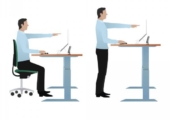March 26, 2014
UK workers are amongst least engaged in the world, claims new report
 The latest survey highlighting how disconnected the world’s workers feel from what they do comes courtesy of researchers ORC International. In its Global perspectives survey of over 7,000 employees in 20 countries, the researchers found that UK employees are amongst the most disengaged in the world. Engagement has declined sharply over the last year for UK based workers with under half (48 percent) claiming to be engaged with their jobs, down from 56 percent last year. This puts the country in 18th position, with only Japan and Hong Kong coming out worse. Only 40 percent think their managers motivate and inspire them and only 37 percent feel encouraged by their employers to innovate. In fact the UK’s score fell according to every measure used in the report including the wellbeing index with a rating of 57 percent, down from 61 percent last year.
The latest survey highlighting how disconnected the world’s workers feel from what they do comes courtesy of researchers ORC International. In its Global perspectives survey of over 7,000 employees in 20 countries, the researchers found that UK employees are amongst the most disengaged in the world. Engagement has declined sharply over the last year for UK based workers with under half (48 percent) claiming to be engaged with their jobs, down from 56 percent last year. This puts the country in 18th position, with only Japan and Hong Kong coming out worse. Only 40 percent think their managers motivate and inspire them and only 37 percent feel encouraged by their employers to innovate. In fact the UK’s score fell according to every measure used in the report including the wellbeing index with a rating of 57 percent, down from 61 percent last year.























December 6, 2013
Extended rights to flexible working could prove a logistical headache for employers
by Pam Loch • Comment, Flexible working, Workplace
A recent decision by the government could result in emptier offices on Fridays and Mondays as staff vie with each other to work from home. This is because from April 2014 onwards, employers will have to be prepared to consider flexible working requests from any employee, not just for employees who have children under the age of 17 or responsibilities as carers. One of the more challenging areas for employers is how to manage condensed hours requests and to keep enough staff covering core office hours, without affecting the business. This could result in employers having to juggle competing flexible working requests from employees who they may not be able to accommodate all at the same time. More →